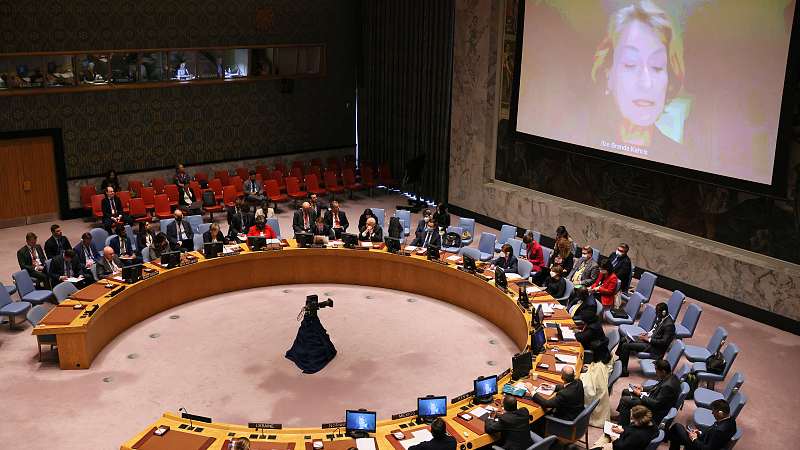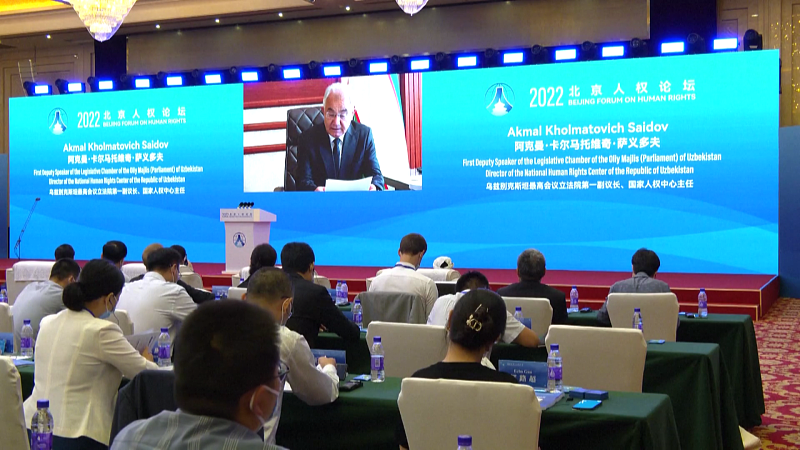
Ilze Brands Kehris, Assistant Secretary-General for Human Rights, speaks virtually during a UN Security Council meeting at the headquarters, New York, U.S., September 7, 2022. /CFP
Ilze Brands Kehris, Assistant Secretary-General for Human Rights, speaks virtually during a UN Security Council meeting at the headquarters, New York, U.S., September 7, 2022. /CFP
Editor's note: Stephen Ndegwa is a PhD student in International Relations at the United States International University-Africa, and the Executive Director of South-South Dialogues, a Nairobi-based communication development think tank. The article reflects the author's opinions and not necessarily those of CGTN.
One would have expected that the Office of the United Nations High Commissioner for Human Rights (OHCHR) is conversant with the true perspective on reporting human rights. Apparently, however, the current and emerging global circumstances have put the onus on China to educate the world on the true nature of human rights.
On September 13, China played this role yet again at the 51st regular session of the UN Human Rights Council (UNHRC) with a discussion on the human rights report. The remarks by Chen Xu, the representative of China's Permanent Mission to the UN Office at Geneva, echoed the sentiments of 30 countries attending the forum.
It is instructive that majority of these countries were developing ones, which means that they have for long been vulnerable to the whims of some Western countries, who have for long dictated the nature of human rights for them.
Chen's remarks evoked a few pertinent issues that the global community needs to consider in monitoring and evaluating the human rights records of countries. One, who determines the yardstick Western countries use to measure human rights for everyone else but themselves? Two, who abrogated this role to these latter-days holier-than-thou global prefects? Three, why the double standards that, for instance, condemns murder on one hand, and on the other condones the same vice depending on the perpetrator?
The West continues to politicize and weaponize human rights as one of the most effective ways of isolating and neutralizing its geopolitical nemeses. One of the prominent cases is the malicious allegations of human rights abuse of Muslims in China's highly productive Xinjiang Uygur Autonomous Region. The West has used baseless allegations to sabotage Xinjiang's economy by calling for the boycott of production and products from the region.
But who is fooling who? The world stands to witness how countries like the U.S. have traumatized Muslim populations across the world, from the Middle East to Afghanistan. Tens of thousands of Muslims have died from the U.S.'s inhuman military escapades in the name of democracy and fighting terrorism.
Now, the COVID-19 pandemic has offered us vital lessons on the basic nature and priorities of human rights. Chen put this issue in perspective: "With COVID-19 resurgences impacting socioeconomic development, especially in developing countries, more attention should be paid to economic, social, cultural, developmental and health rights of the people."

2022 Beijing Forum on Human Rights held in Beijing, China, July 26, 2022. /CFP
2022 Beijing Forum on Human Rights held in Beijing, China, July 26, 2022. /CFP
This is an issue that cropped up recently when CNN international correspondent Christiane Amanpour interviewed Kenya's President William Ruto. Christiane asked Ruto's stand on gay rights in the country. The latter maintained that while Kenya respects everybody, homosexuality "is not a big issue for the people of Kenya." In any case, respect is a two-way traffic and Kenya expects reciprocation for its people's cultural beliefs.
Anyway, at the moment, the country's leadership is grappling with grave challenges including unemployment, a struggling economy, drought and the socio-economic effects of the COVID-19 pandemic. The country has not reached a stage where its citizens feel that gay rights should be openly discussed though they affect a considerable demographic.
This brings up the issue of funding for human rights. While the West is giving millions of dollars every year to support gay rights and fund other areas where it has selfish interests, the real problems continue to be underfunded or ignored altogether. Developing countries are in need of emergency funds to address children's hunger and malnutrition, and to treat various diseases that plague the mass of their population.
China has carried out three action plans on human rights since 2009. The latest report, "Human Rights Action Plan of China (2021-2025)" released in September 2021, notes that the country's socio-economic progress has been commensurate to the country's human rights track record both at national and international levels.
Indeed, the next phase of human rights as contained in the report is in tandem with the five-year period from 2021 to 2025 in which China has set out on a new journey towards the Second Centenary Goal of building a modern socialist country.
The new Action Plan adheres to the constitutional principle of respecting and protecting human rights, and the Outline for the 14th Five-Year Plan for Economic and Social Development and Long-Range Objectives through the Year 2035. It follows the spirit embodied in the Universal Declaration of Human Rights and other international human rights conventions. It also takes into consideration the new challenges brought by the COVID-19 pandemic which have necessitated reviewing what had always been taken for granted around the world.
Every voice should be heard and accepted on its own merit. The Western media should not abuse its pervasiveness to manipulate facts and misinform the world of developments whose subjects have little choice in replying to such far-reaching claims.
(If you want to contribute and have specific expertise, please contact us at opinions@cgtn.com. Follow @thouse_opinions on Twitter to discover the latest commentaries on CGTN Opinion Section.)

